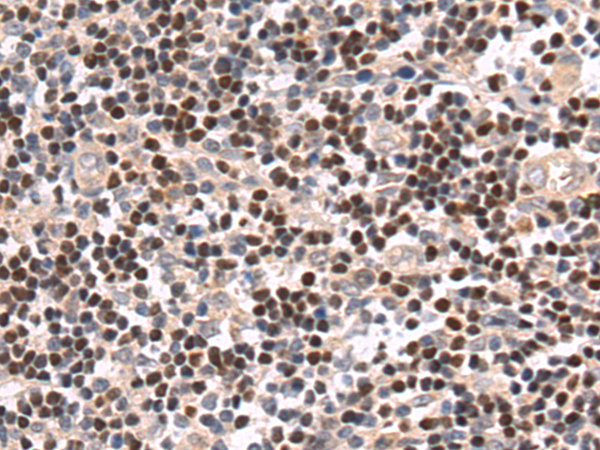
| WB | 咨询技术 | Human,Mouse,Rat |
| IF | 咨询技术 | Human,Mouse,Rat |
| IHC | 1/50-1/200 | Human,Mouse,Rat |
| ICC | 技术咨询 | Human,Mouse,Rat |
| FCM | 咨询技术 | Human,Mouse,Rat |
| Elisa | 1/5000-1/10000 | Human,Mouse,Rat |
| Aliases | LEF-1; TCF10; TCF7L3; TCF1ALPHA |
| Host/Isotype | Rabbit IgG |
| Antibody Type | Primary antibody |
| Storage | Store at 4°C short term. Aliquot and store at -20°C long term. Avoid freeze/thaw cycles. |
| Species Reactivity | Human, Mouse, Rat |
| Immunogen | Fusion protein of human LEF1 |
| Formulation | Purified antibody in PBS with 0.05% sodium azide and 50% glycerol. |
+ +
以下是3-4篇与**LEF1抗体**相关的文献示例(内容基于学术背景知识整理,建议通过数据库核实原文):
---
1. **文献名称**:*"LEF1 expression in T-cell development and leukemogenesis"*
**作者**:Travis A. et al.
**摘要**:研究LEF1在T细胞分化中的调控作用,利用特异性抗体进行免疫染色,发现LEF1异常表达与T细胞急性淋巴细胞白血病(T-ALL)的发生密切相关。
2. **文献名称**:*"LEF1/β-catenin complex activates survivin to promote colorectal cancer progression"*
**作者**:Hovanes K. et al.
**摘要**:通过免疫组化(使用LEF1抗体)分析结肠癌组织,揭示LEF1与β-catenin协同促进癌基因survivin表达,导致肿瘤侵袭性增强及患者预后不良。
3. **文献名称**:*"LEF1 controls hair follicle differentiation through Wnt signaling"*
**作者**:Niemann C. et al.
**摘要**:利用LEF1抗体在小鼠模型中定位蛋白表达,发现LEF1通过调控Wnt通路靶基因,主导毛囊干细胞的分化与再生过程。
4. **文献名称**:*"LEF1 as a biomarker in pediatric acute lymphoblastic leukemia"*
**作者**:Müller-Tidow C. et al.
**摘要**:通过流式细胞术和Western blot(基于LEF1抗体)检测白血病细胞,证实LEF1高表达与儿童患者化疗耐药性显著相关。
---
建议通过**PubMed**或**Google Scholar**检索上述标题或作者,获取全文及准确信息。
The LEF1 (Lymphoid Enhancer-Binding Factor 1) antibody is a crucial tool for studying the role of LEF1. a transcription factor in the Wnt/β-catenin signaling pathway. LEF1 belongs to the TCF/LEF family of DNA-binding proteins and regulates the expression of target genes involved in cell proliferation, differentiation, and embryonic development. It interacts with β-catenin to activate Wnt-responsive genes, playing pivotal roles in tissue homeostasis, immune cell development, and cancer progression. Dysregulation of LEF1 is linked to various cancers, including colorectal carcinoma, leukemia, and breast cancer, making it a biomarker and therapeutic target.
LEF1 antibodies are widely used in research to detect LEF1 expression and localization via techniques like Western blotting, immunohistochemistry (IHC), immunofluorescence (IF), and flow cytometry. These antibodies specifically recognize epitopes in human, mouse, or rat LEF1. depending on their design. Monoclonal antibodies offer high specificity, while polyclonal versions may detect broader epitopes. Validated applications often include assessing Wnt pathway activation, studying epithelial-mesenchymal transition (EMT) in cancer, or analyzing developmental biology processes.
Commercial LEF1 antibodies are typically raised against recombinant protein fragments or specific domains (e.g., the N-terminal β-catenin-binding region). Researchers prioritize antibodies validated for species reactivity, post-translational modifications, and cross-reactivity with related TCF/LEF proteins. Proper controls, such as knockout cell lines or siRNA-mediated knockdown, are essential to confirm antibody specificity in experimental settings.
×